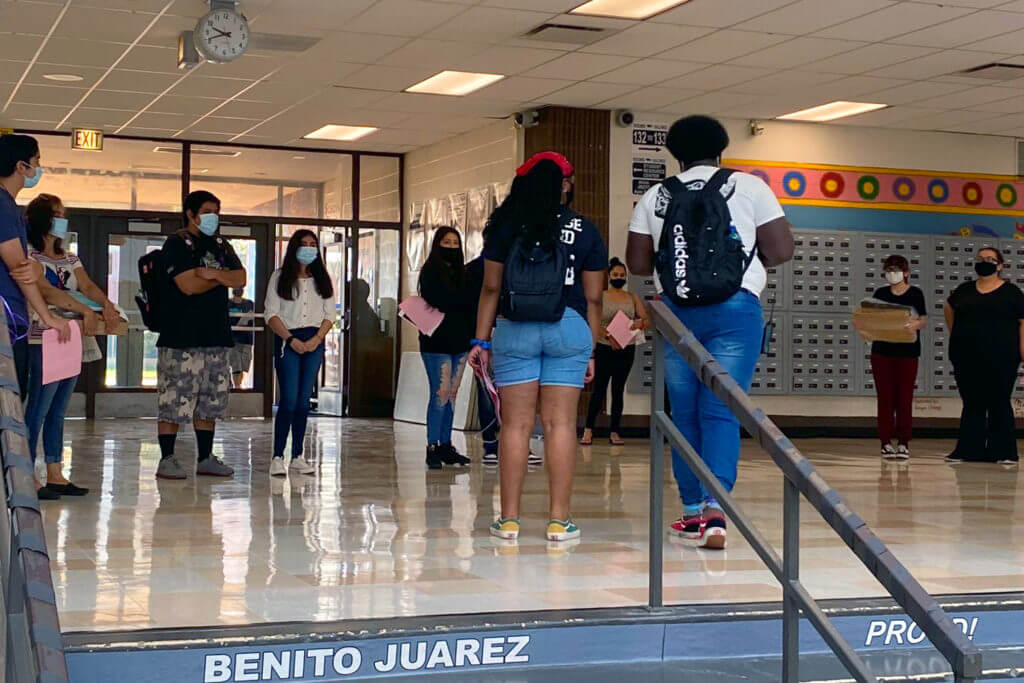I recently was fortunate enough to talk with Principal Juan Carlos Ocon of Benito Juarez Community Academy, a Chicago neighborhood public high school, about his teams’ plans for welcoming students back in the fall and how they hope to assess and meet students’ needs in this most unusual of years. Juarez is a competency-based education (CBE) school, and I’d intended to have a conversation about how Juarez will be using competency concepts to gauge where students are academically and then move them forward without the constraints of traditional seat time requirements. Instead, what I got was a whole lot about social and emotional learning (SEL). CBE means different things at different schools, but at Juarez, it means a focus on equity—and that means prioritizing social-emotional skills, or developmental/adaptive competencies, as well as academics. As Principal Ocon said, “CBE is designed for every student to succeed because it holds every student to rigorous competencies that emphasize higher-order academic, social, and emotional skills that 21st Century jobs require.”
Juarez is almost 95% Latinx and over 92% low-income. The pandemic isn’t easy for anyone, but many Juarez students have had a seriously tough 18 months. From limited Wi-Fi and appropriate at-home study spaces to stepping up as the main family breadwinner, from moving to the suburbs or even back to Mexico to be near extended family to tragically losing family and friends to the illness; recovery for these kids will be about more than academic learning.
As I talked with Principal Ocon, he—in his wise way—kept bringing our conversation around to the importance of relationships, especially for the Juarez student population. And there’s ample research to back that up, including a forthcoming study from the Annenberg Institute which found that students do better with school-based mentors, but underserved students are less likely to have them. For Principal Ocon, relationships are intimately entwined with an engaging CBE curriculum, and he hopes the combination will lead to recovery. He believes that if the curriculum is relevant and meaningful to students then they will have powerful learning experiences, and that will impact engagement and lead to strong relationships with teachers.
The more we talked, the more I felt the need to share this year’s Juarez approach. Because while being a CBE school gives Juarez a leg up with these strategies, there is a lot that could be useful at all kinds of schools. Here are some of the ways Juarez plans to engage students on the road to pandemic recovery:
- 100-Minute Block Scheduling – Juarez will capitalize on what it learned from remote and hybrid models about asynchronous instruction; that it can be useful and necessary. In 100-minute blocks teachers will have the option for student independent study so they can use class time for wellness checks, to provide recovery time for students who are lagging behind, and to build those critical relationships. Juarez hopes the extended time will give teachers and students the space to connect every period, not just schoolwide once a month or once a week, or in assemblies or before or after school. Juarez is developing a protocol for teachers to guide their conversations during this one-on-one synchronous time so they can understand what students’ SEL needs are. Principal Ocon told me, “With over 1,800 students, I don’t have enough clinicians and counselors. We need to leverage teachers. Our hope is that those relationships will create the trust and confidence for students to inform us when they need more support from our clinicians. That has to be strategic during those 100 minutes.”
- Student Unit Review – Each summer, Juarez hosts a CBE Teachers’ Academy when teachers meet in the building, in course teams, to develop common units and assessments highlighting the Juarez theme for the year. This year a group of students will provide feedback, making sure the units affirm their cultural identity and sense of belonging. Juarez worked with Diversify Our Narrative to develop a rubric and train students to give teachers quality feedback so that the topics of the units are interesting, relevant, and relatable.
- Employing Parents – Since Juarez has been a CBE school with an explicit focus on engagement for years, they didn’t have the level of student disengagement that some other schools experienced. It also helped that they were able to accommodate students who needed to engage outside of regular school hours and on weekends. But they did lose touch with some students. Principal Ocon conducted interviews with parents of students who had disconnected to understand the barriers they were facing. Three of the parents he spoke with were “refreshingly direct,” so he hired them to help find ways to reconnect with students and families. They continue to work for Juarez, calling families, holding interviews, and doing presentations. “They understand what our families are going through and are able to have conversations that school staff couldn’t have because their own families are going through so much and they understand.”
I still think CBE has a lot to offer in the way of strategies for dealing with academic pandemic fallout, but as Principal Ocon kept reminding me, this year needs to be about relationships. As he told me, “If we focus on the developmental side of CBE, that will have a clear and powerful impact on the academic; whereas if we focus on the academic, that will never impact the developmental, at least not in direct and meaningful ways.” When I asked Principal Ocon what he would say to other principals about the benefits of CBE, this is what he told me. “During the pandemic, I heard from so many principals about how they were innovating and I was in awe of what they did. They innovated in a way that was so student-focused, and that’s what we need to be doing as leaders. Principals don’t want to return to whatever normal was for us. They want to continue innovating, and CBE demands that they continue taking risks; risks that will benefit students. And at the end of the day, that’s why we’re doing this.”



